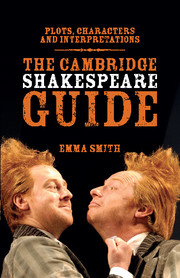Shakespearean apocrypha
Published online by Cambridge University Press: 05 April 2012
Summary
From relatively early in Shakespeare’s writing career works not now believed to be his were attributed to him (the so-called Apocrypha). Sometimes this was explicit, as in The Yorkshire Tragedy which was printed with the designation ‘Written by W. Shakespeare’ (1608; it is now generally attributed to Middleton, although some scholars still believe Shakespeare had at least a hand in it). On other occasions the suggestion was implicit: The Lamentable Tragedy of Locrine was printed in 1595 as ‘Newly set forth, overseen and corrected, by W. S.’ (no other author has been firmly identified). Both these plays, plus The London Prodigal, Sir John Oldcastle, The Puritan Widow and The History of Thomas Cromwell, were added to the Shakespeare Folio (along with Pericles) in its third edition of 1663/4, but there has been little critical support for this post hoc attribution.
The cases of Pericles and The Two Noble Kinsmen, now known to be at least partly by Shakespeare, have made it difficult to hold the line that John Heminge and Henry Condell, two actors remembered in Shakespeare’s will, were in the best position to know the extent of his canon, and that therefore everything was gathered together in the First Folio in 1623 – since neither of these plays was included. A number of plays have created speculative interest, although there is no external evidence to suggest that any of them is by Shakespeare.
- Type
- Chapter
- Information
- The Cambridge Shakespeare Guide , pp. 235 - 236Publisher: Cambridge University PressPrint publication year: 2012



